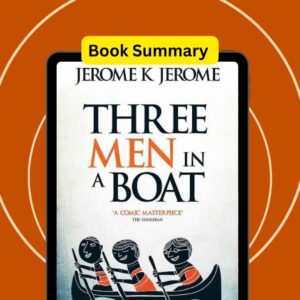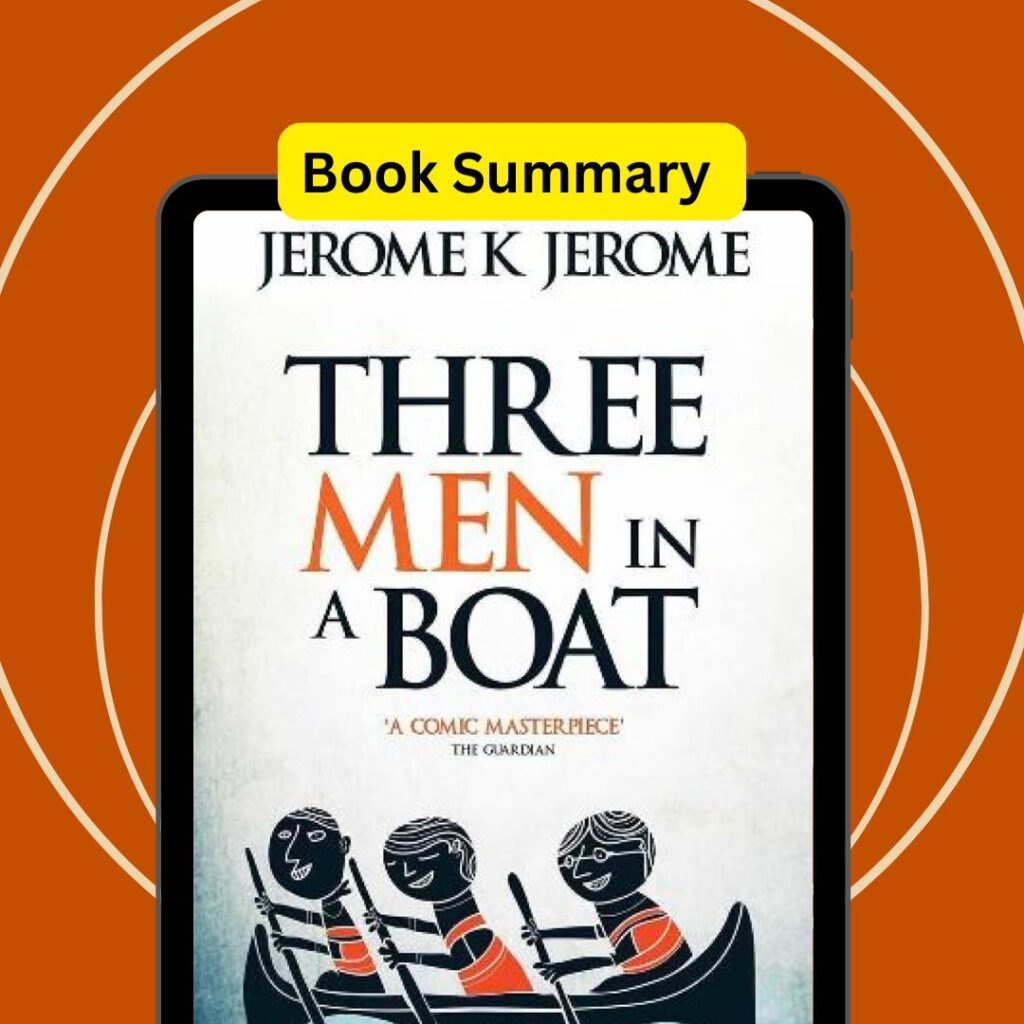Three Men in a Boat: Summary and Key Insights
Three Men in a Boat (To Say Nothing of the Dog) is a humorous novel written by Jerome K. Jerome, first published in 1889. This delightful tale chronicles the misadventures of three friends—J. (the narrator), George, and Harris—along with J.’s dog, Montmorency, as they embark on a boating holiday along the River Thames. Initially intended as a serious travel guide, the book evolved into a comedic narrative filled with witty observations and humorous anecdotes about life, friendship, and the challenges of boating. This blog will provide an extensive summary of Three Men in a Boat, exploring its characters, themes, and enduring appeal.

Table of Contents
Jerome K. Jerome: A Brief Biography
Jerome Klapka Jerome was an English writer and humorist born on May 2, 1859, in Calstock, Cornwall. He is best known for his comic works, particularly Three Men in a Boat, which has remained popular for over a century. Jerome’s writing style combines humor with keen social commentary, making his works relatable across generations. He often drew inspiration from his own experiences and observations of human behavior, which added authenticity to his narratives.
Setting
The story is set in late Victorian England and follows the picturesque River Thames from Kingston upon Thames to Oxford and back. The novel captures the beauty of the English countryside while providing humorous insights into the characters’ interactions with their surroundings.
Main Characters
- J. (Jerome): The narrator and central character who embodies wit and self-deprecation. He often reflects on his experiences and observations throughout the journey.
- George: J.’s friend who works at a bank. He is practical but often gets caught up in the group’s antics.
- Harris: Another friend who is characterized by his incompetence and tendency to create chaos during their trip.
- Montmorency: J.’s spirited dog, whose antics provide comic relief and add to the overall humor of the story.
Plot Summary
The narrative begins with J., George, and Harris discussing their various ailments while lounging in J.’s room. They conclude that they are suffering from overwork and decide to take a holiday to recover their health. After some deliberation, they agree on a boating trip along the Thames.
Preparing for the Journey
The friends make plans for their trip, compiling an extensive list of items to bring along. However, they quickly realize that packing is more challenging than anticipated due to their forgetfulness and indecisiveness. They finally manage to gather their belongings, including food supplies and camping gear.
The Journey Begins
On the day of departure, George has to work at the bank before joining J. and Harris at Kingston. The duo struggles to find their train at Waterloo Station but manages to bribe a train driver to take them to Kingston. Once they arrive, they collect their hired boat and set off on their adventure.
Humorous Mishaps
As they travel along the river, the trio encounters various humorous situations:
- Setting Up Camp: They struggle to set up their camping cover over the boat, leading to comical entanglements.
- Food Fiascos: Their attempts at cooking lead to disastrous results—especially when they try to prepare Irish stew using leftover food from their hamper.
- Montmorency’s Antics: Montmorency’s mischievous behavior adds levity to their journey as he attempts to contribute to dinner by bringing back a dead water rat.
Throughout their travels, J. shares anecdotes about historical landmarks they pass, such as Hampton Court Palace and Magna Carta Island. These digressions provide insight into English history while maintaining a lighthearted tone.
Encounters Along the Thames
The men meet various characters during their journey:
- They come across locals who boast about catching fish that turn out to be models hanging on pub walls.
- They witness a floating corpse in the river—a somber moment that contrasts sharply with their otherwise lighthearted adventure.
Despite these encounters, J., George, Harris, and Montmorency continue their journey with humor and camaraderie.
Reflections on Life
As they navigate challenges like bad weather and misunderstandings among themselves, J.’s reflections on life become more profound:
- He muses about friendship and loyalty while recounting stories from their past adventures.
- The trio’s interactions highlight human nature’s quirks—how people often exaggerate or misrepresent experiences for comedic effect.
Conclusion of Their Trip
After several days of boating filled with laughter and mishaps, the friends reach Oxford but decide that returning home by boat is too arduous due to inclement weather. Instead, they abandon their plans for further boating adventures and opt for an inn where they can enjoy warm meals without hassle.The story concludes with J., George, Harris, and Montmorency returning home with fond memories of their escapades along the Thames—a journey marked by friendship, humor, and self-discovery.
Key Themes
1. Friendship
At its core, Three Men in a Boat celebrates friendship through shared experiences and laughter. The bond between J., George, Harris, and Montmorency highlights how camaraderie can enhance life’s adventures.
2. Humor in Everyday Life
Jerome’s writing emphasizes finding humor in mundane situations—whether it’s struggling with camping gear or navigating social interactions—reminding readers that laughter can alleviate stress.
3. The Absurdity of Human Nature
The novel explores human foibles through its characters’ antics and misadventures. Jerome illustrates how people often exaggerate ailments or misinterpret situations for comedic effect.
4. Nature’s Beauty
The picturesque setting along the Thames serves as both backdrop and character within the story. Jerome’s vivid descriptions invite readers to appreciate nature’s beauty while reflecting on its impact on human experience.
5. The Challenge of Leisure
Jerome humorously critiques how leisure activities can become complicated due to human nature—highlighting that even simple pleasures like boating can lead to chaos when people are involved.
Writing Style
Jerome K. Jerome employs a conversational writing style characterized by wit and humor throughout Three Men in a Boat. His use of first-person narration allows readers insight into J.’s thoughts while creating an intimate connection with the characters. The narrative features digressions filled with anecdotes that enhance comedic moments while providing historical context about locations along the Thames River. Jerome’s ability to blend humor with insightful observations makes this work timelessly relatable.
Impact and Legacy
Three Men in a Boat has endured as one of English literature’s most beloved comedic novels since its publication over a century ago:
Cultural Influence
The book has inspired numerous adaptations across various media—including stage productions, films, radio dramas—and continues influencing modern storytelling about friendship and adventure.
Timeless Appeal
Readers from different generations find resonance within its themes—whether it’s navigating friendships or finding joy amidst the chaos—ensuring its place as an enduring classic that remains relevant today.
FAQs
What is Three Men in a Boat about?
Three Men in a Boat is a comedic novel by Jerome K. Jerome that follows the misadventures of three friends—J., George, and Harris—who decide to take a boating trip along the River Thames. The story is filled with humorous anecdotes, observations about life, and reflections on friendship.
Who is the author of the book?
The author is Jerome K. Jerome, an English writer and humorist known for his witty style and insightful commentary on human behavior. This novel, first published in 1889, remains one of his most popular works.
What are the main themes of the book?
Key themes include:
- Friendship: The dynamics between the three main characters highlight the importance of camaraderie.
- Humor in Everyday Life: The book showcases how humor can be found in mundane situations.
- Travel and Adventure: The journey serves as a backdrop for exploring both physical and personal adventures.
How is the book structured?
The book is structured as a travel narrative interspersed with humorous anecdotes and reflections. It combines elements of a diary, with each character contributing to the story through their thoughts and experiences.
What can readers expect from this book?
Readers can expect a light-hearted read filled with comedic moments, relatable characters, and insightful observations about life and travel. The narrative’s charm lies in its ability to entertain while also providing social commentary.
Who would benefit from reading this book?
Three Men in a Boat is suitable for anyone looking for an entertaining and humorous read. It appeals to fans of classic literature, travel enthusiasts, and those who enjoy stories about friendship and adventure.
Are there any memorable characters in the story?
Yes, the main characters—J., George, and Harris—each have distinct personalities that contribute to the humor of the story. Their interactions and mishaps create a dynamic that resonates with readers.
What makes this book a classic?
The timeless humor, relatable themes, and vivid descriptions of life along the Thames have made Three Men in a Boat a classic. Its exploration of human nature and friendship continues to resonate with readers today.
Is there any deeper meaning behind the humor?
While primarily comedic, the book also offers insights into human nature, societal norms, and the challenges of everyday life. Jerome’s witty observations often reveal deeper truths about relationships and personal aspirations.
Conclusion
Three Men in a Boat is more than just a humorous account of three friends’ boating holiday; it encapsulates timeless themes surrounding friendship, human nature’s absurdities, and leisure challenges—and ultimately celebrates life’s simple pleasures through laughter. Jerome K. Jerome’s masterful storytelling invites readers into an engaging world filled with relatable characters whose misadventures remind us all that sometimes it’s not about reaching our destination but enjoying every moment along the way. As you reflect upon your own experiences—whether embarking on journeys or navigating friendships—remember that laughter can turn ordinary moments into extraordinary memories worth cherishing forever! This comprehensive summary captures essential elements from Three Men in a Boat, ensuring an SEO-optimized structure suitable for engaging readers interested in classic literature while emphasizing key messages relevant across generations.
Discover marketing services, interviews & publishing tools at SharingStories.


